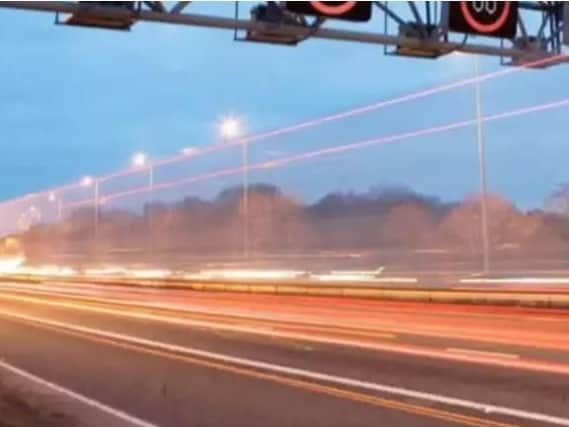How the Smart motorway cameras on the M1 work - and how to avoid a fine


The M1 was transformed into a 'smart motorway' across various sections in the past year, including between junction 32 and 35A, but there has been much debate about whether the newly-installed speed cameras were active when no temporary speed limits were in place.
Advertisement
Hide AdAdvertisement
Hide AdOverhead gantries are used to apply temporary speed limits and lane closures when there are incidents on the carriageway and drivers will be flashed for breaking the limits.
Sections near Leeds, near Wakefield and near Sheffield all have electronic signs which flash into life when speed limits have been altered.
And now, for the first time, South Yorkshire Police and South Yorkshire Safety Camera Partnership, who are in charge of speeding fines across parts of the M1, have said they have the power to use the cameras 'when it is deemed appropriate'.
Will I get fined for speeding if the signs are not switched on?
Advertisement
Hide AdAdvertisement
Hide AdIf no special speed limit is displayed then the national speed limit applies.
A speed limit displayed inside a red circle is legally enforceable. If you don’t keep to this speed limit, you are breaking the law.
Speed cameras are in operation on smart motorways. If you don’t keep to the speed limit, you may receive a fine.
A spokeswoman said: "South Yorkshire Police and South Yorkshire Safety Camera Partnership have the capability to enforce the posted or national speed limit on all roads within South Yorkshire including the motorway network.
Advertisement
Hide AdAdvertisement
Hide Ad"Such enforcement will take place when it is deemed appropriate and proportionate to do so in order to prevent or reduce road collisions and casualties and protect all road users."
So yes, the cameras can flash you at any time, even if the screens are off.
Of course, the best way to avoid a ticket is to not speed...
What does the Red X mean?
Advertisement
Hide AdAdvertisement
Hide AdOne of the most important signs to get to know on a smart motorway is the red X. This indicates that a lane is closed.
If you see a red X closing a lane, move out of that lane promptly. If you don’t, you may receive a fine.
A lane might be closed because there is debris in the road, or because of a person or animal on the road.
There may be an accident or a breakdown up ahead. Police may be keeping the lane clear for the emergency services, such as an ambulance.
Advertisement
Hide AdAdvertisement
Hide AdIf you drive in a Red X lane, you can get an immediate fine and points on your licence.
When should I drive in the hard shoulder on a Smart motorway?
On smart motorways you will see refuge areas spaced regularly alongside the motorway. You should use these in emergencies.
This is because on some smart motorways the hard shoulder can be opened up for traffic to use at busy times.
Advertisement
Hide AdAdvertisement
Hide AdIf it is open for use you will see a speed limit displayed over it.
If there is no sign, or a red X is displayed, then normal hard shoulder rules apply. In other words, do not use it except in emergency.
A hard shoulder is always clearly identified with a solid white unbroken line.
On other types of smart motorway, the hard shoulder has been permanently converted into an extra lane.
Advertisement
Hide AdAdvertisement
Hide AdWhere this is the case the lane looks like any other lane, ie it is marked with a broken white line.
What should I do if I need to stop on the Smart motorway in an emergency?
According to the DVLA, you should follow these steps:
Use an emergency refuge area if you are able to reach one safely. These are marked with blue signs featuring an orange SOS telephone symbol on them.
Advertisement
Hide AdAdvertisement
Hide AdIf you can leave your vehicle safely, contact Highways England via the roadside emergency telephone provided in all emergency refuge areas.
We will either send a traffic officer to help you, or set the motorway signs to temporarily clear lane 1 to assist you to rejoin the motorway.
If you cannot get to an emergency refuge area but the vehicle can be driven, move it to the hard shoulder (where provided) or as close to the nearside verge or other nearside boundary as possible.
In all cases, switch on your hazard warning lights.
If you stop in the nearside lane next to a hard shoulder or verge and feel you are able to exit safely with any occupants, consider exiting your vehicle via the nearside (left hand) door, and wait behind the safety barrier, if there is one and safe to do so.
Advertisement
Hide AdAdvertisement
Hide AdIf it is not possible to get out of your vehicle safely, or there is no other place of relative safety to wait then you should stay in your vehicle with your seat belt on and dial ‘999’ if you have access to a working mobile phone.
Once the regional traffic control centre is aware of your situation, via the police or roadside technology such as CCTV, they can use the smart motorway technology to set overhead signs and close the lane to help keep traffic away from you. They will also send a traffic officer or the police to help you.